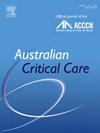Ward nurses’ roles and responsibilities during rapid response team activation for patient deterioration: A scoping review
IF 2.7
3区 医学
Q2 CRITICAL CARE MEDICINE
引用次数: 0
Abstract
Objectives
The aim of this scoping review was to explore the existing literature to identify key existing concepts in relation to ward nurses’ engagement and experience during rapid response team (RRT) activation for patient deterioration and highlight gaps in the research.
Review method used
The Joanna Briggs Institute methodology was used. The Patterns, Advances, Gaps, Evidence for Practice and Research Recommendations framework was used in a reflective manner alongside the Preferred Reporting Items for Systematic Reviews and Meta-Analyses extension for Scoping Reviews guidelines to guide data synthesis, charting, and reporting of the findings.
Data sources
In September 2023, electronic databases—MEDLINE (Ovid), CINAHL Complete (via EBSCO), Embase, Scopus, PubMed, and Google Scholar, for published works, and Web of Science and Networked Digital Library of Theses and Dissertations—were searched. Searches were accompanied by hand-searching grey literature and reference lists.
Review methods
Articles were selected according to inclusion and exclusion criteria. A full-text review was completed by two authors independently, with any disagreement resolved by consensus by the third author. A table was developed to extract key information from the eligible studies.
Results
Twenty-seven articles were included in the review. Findings highlighted three main patterns: (i) ward nurses' experience; (ii) ward nurses' scope of practice; and (iii) mechanisms affecting ward nurses’ engagement with the RRT.
Conclusions
This review identified that the roles and responsibilities of ward nurses during a joint rescue with the RRT are unclear. Multiple mechanisms that impacted the ward nurses' engagement within the RRT were highlighted in this review. Further education and training and specific guidelines on the ward nurses’ role during RRT activation events may help the ward nurses feel more valued as a team member of the RRT and be better prepared and trained to provide nursing care during medical emergencies. Due to the limited data available on the topic, more research regarding the role of ward nurses is necessary.
病房护士的角色和责任,在快速反应小组激活的病人恶化:范围审查
目的本综述的目的是探索现有文献,以确定在快速反应小组(RRT)启动期间病房护士参与和经验的关键现有概念,并突出研究中的空白。采用回顾方法采用乔安娜布里格斯研究所的方法。模式、进展、差距、实践证据和研究建议框架以反思的方式与系统评价的首选报告项目和范围评价的元分析扩展指南一起使用,以指导数据合成、制图和报告结果。数据来源2023年9月,检索了medline (Ovid)、CINAHL Complete (via EBSCO)、Embase、Scopus、PubMed、谷歌Scholar等电子数据库的已发表作品,以及Web of Science和网络数字论文图书馆。搜索伴随着手工搜索灰色文献和参考书目。综述方法根据纳入和排除标准选择文章。全文评审由两位作者独立完成,任何分歧由第三位作者协商一致解决。我们制作了一个表格,从符合条件的研究中提取关键信息。结果共纳入文献27篇。调查结果突出了三个主要模式:(i)病房护士的经验;(ii)病房护士的执业范围;以及(iii)影响病房护士参与RRT的机制。结论:本综述发现,在与RRT联合抢救中,病房护士的角色和职责尚不明确。本综述强调了影响病房护士参与RRT的多种机制。进一步的教育和培训以及关于病房护士在RRT激活事件中的角色的具体指导,可能有助于病房护士作为RRT团队成员感到更有价值,并更好地准备和培训在医疗紧急情况下提供护理。由于有限的数据可用的话题,更多的研究关于病房护士的作用是必要的。
本文章由计算机程序翻译,如有差异,请以英文原文为准。
求助全文
约1分钟内获得全文
求助全文
来源期刊

Australian Critical Care
NURSING-NURSING
CiteScore
4.90
自引率
9.10%
发文量
148
审稿时长
>12 weeks
期刊介绍:
Australian Critical Care is the official journal of the Australian College of Critical Care Nurses (ACCCN). It is a bi-monthly peer-reviewed journal, providing clinically relevant research, reviews and articles of interest to the critical care community. Australian Critical Care publishes peer-reviewed scholarly papers that report research findings, research-based reviews, discussion papers and commentaries which are of interest to an international readership of critical care practitioners, educators, administrators and researchers. Interprofessional articles are welcomed.
 求助内容:
求助内容: 应助结果提醒方式:
应助结果提醒方式:


